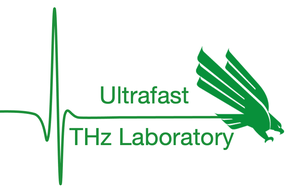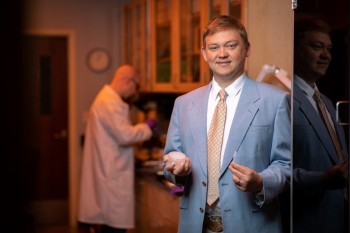We are not only interested in polymeric biomaterials but in biomaterials in general. And with this, we are always happy to collaborate with others to complement their research with our expertise in mechanical and thermomechanical characterization, and biocompatibility of biomaterials. Our belief is that research, especially in the field of biomedical engineering, should be collaborative and multidisciplinary.
We are always looking for collaborations and partners in academia and industry. No project is too small for us. If you are interested in working with us, please contact Dr. Ecker.
Below are some of our established collaborations.

We collaborate with Dr. Jincheng Du and his Functional Glasses and Materials Modeling Laboratory at the University of North Texas, which specializes in functional glass and ceramic materials for biomedical, electronic, environmental, and energy applications. Their research combines experimental and computational approaches, with a strong focus on atomistic simulations—including classical and ab initio molecular dynamics, first principles calculations, and Monte Carlo methods.

We collaborate with Dr. George Alexandrakis at the University of Texas at Arlington on the development of innovative neurotechnology. Together, we co-mentor senior design teams focused on creating self-softening dry EEG probes—a promising advancement aimed at improving comfort and performance in wearable brain-monitoring devices.

Neu Lab at the Department of Physics at UNT. Their research focuses on Ultrafast and Terahertz Spectroscopy.

Our lab is a member of the Center for Functional Materials. This center is under the umbrella of the Advanced Materials and Manufacturing Processes Institute here at UNT.

Our lab is part of the strategic research area ‘sensor systems‘ at UNT. Specifically, we are within the bio-sensors sub-group.
Our research in sensor technologies involves 12+ faculty members leading over 50 graduate and undergraduate students from the departments of materials science engineering, electrical engineering, mechanical engineering, and computer science and computer engineering.

We maintain an active collaboration with Dr. Walter Voit and the Advanced Polymer Research Lab at the University of Texas at Dallas. As my former postdoctoral advisor, Dr. Voit and I continue to work closely on the development of flexible and self-softening bioelectronic devices, combining advanced polymer science with innovative biomedical applications. Our joint efforts have led to multiple peer-reviewed publications and ongoing research in this exciting field.

Smaldone Research Lab at UTD. Their research lies at the interface of organic and materials chemistry. The Smaldone Group uses the principles of organic synthesis and supramolecular chemistry to create new polymeric materials for energy storage and 3D printing applications.

Seed funding project from UNT to foster collaboration between the College of Science and the College of Engineering. Our lab is working with:
- Dr. Diana Berman (MTSE)
- Dr. Jeffry Kelber (CHEM)
- Dr. Thomas Cundari (CHEM)

Qualia Oto – A Qualia Inc. Company. As a biomedical device company passionate about improving the lives of individuals through better hearing technology, Qualia Oto utilizes our core innovations to produce top-quality, shape-changing polymers and matrix-addressed electrode arrays embedded in devices for our customers’ medical and personal needs.

Dr. Golden Kumar and his Advanced Materials and Manufacturing Lab at the University of Texas at Dallas. Their research interests are in the field of advanced materials such as metallic glasses, composites, graded materials, and high-entropy alloys.
